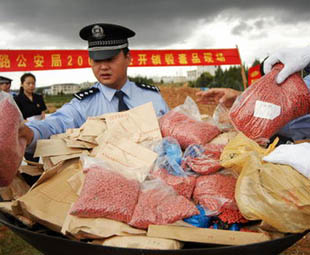Transnational drug trafficking has been effectively curbed, and running big rackets across China's borders made almost impossible, senior police officers said yesterday.
This is the first time in years that police have made such a statement, and it means law enforcement agencies have thwarted attempts to use the country as a transit point and make it a consumption market for drugs.
According to Ministry of Public Security figures, border police unearthed 265 drug-trafficking cases in the first 9 months of this year, up 40 percent year-on-year.
But Yunnan Province, bordering Vietnam, Laos and Myanmar, and the Xinjiang Uygur Autonomous Region, which shares the border with Afghanistan, remain high-risk areas.
Deputy director of the ministry's anti-drug bureau Liu Yuejin said the rise in busted cases was the result of intensified police work.
"We've set up a comprehensive system, covering land, sea, air and postal channels, to prevent drugs from entering China," Liu told a press conference in Beijing.
For example, he said, the central government has granted special funds to equip forces patrolling the country's high-risk borders with advanced drug detectors.
The campaign targeting big drug traffickers near China's borders is behind the success, Liu said. Many big drug dealers operate from near the Yunnan border - northern Myanmar, for instance. Police have launched a campaign called "Nail Pulling", with the help of neighboring countries, and arrested 76 big dealers in the past two years.
Cooperation with the Philippines' police helped bust a big transnational racket in September this year. Ten suspects were held and 63 kg of ice or semi-finished ice were seized.
Also, the government has intensified intelligence exchange and joint law enforcement with Afghanistan, Pakistan, Tajikistan, Thailand and even the US and Canada, Liu said.
"These efforts have weakened transnational drug trafficking groups greatly They are now almost unable to run big operations across China's borders."
Penalties on new drugs
Judicial officers will find it easier to punish people trafficking new drugs such as ice, ecstasy and Ketamine as the government is expected to announce the detailed penalty measures for such cases soon, Liu said.
"Since these drugs (some made domestically) are spreading across the country, the judiciary is drafting specific measures to better handle such cases," Liu said.
The Criminal Law specifies penalties only for trafficking traditional drugs such as heroin and opium. For instance, it says those who make, smuggle or sell more than 50 grams of heroin or 1 kg of opium face sentences from 15 years to the death penalty, but doesn't mention the new drugs.
Ministry figures released yesterday showed that police across the country cracked more than 50,000 drug cases from January to November this year, up 18 percent year-on-year.
The seizure of new drugs from January to November rose sharply. The amount of ice seized reached 6.2 tons, up 2.6 percent. The seizures of ecstasy and Ketamine rose to 2 million pills and 5.2 tons, 4.2 and 2.1 times those of last year.
(China Daily December 26, 2007)


